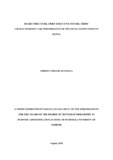| dc.description.abstract | The corporate scene has witnessed boardroom tussles and corporate collapses around the globe.
Kenya has not been spared by this wave of corporate scandals and collapses, and neither has
the financial services' sector been spared and some firms that have been affected in Kenya
include Imperial Bank, Chase Bank, Dubai Bank and National Bank of Kenya. The underlying
thesis is that a crisis of governance is basically a crisis of board of directors. The decline in
shareholders’ wealth and most of these firm failures has been linked to the board of directors.
It is against this backdrop that the general objective of the study was to determine the effect of
board structure on performance of financial institutions in Kenya. Further, it specifically sought
to examine the intervening influence of CEO tenure and moderating influence of firm
characteristics on the association between board structure and performance.
Corresponding null hypothesis were formulated in line with each of this objectives. The
study was majorly anchored on agency theory and used positivistic philosophy in testing four
quantitative hypotheses. Secondary data was collected from financial institutions in Kenya for
a ten-year period from 2006 to 2015. The study used both a correlation descriptive research
design and cross-sectional survey design. The data collected was subjected to correlation,
generalized estimating equation (GEE) and regression analysis. The result produced from the
data analysis models was to confirm the bi-directional association between board structure and
firm performance; and to confirm that CEO tenure and firm characteristics impacted this
relationship. Board structure was disaggregated into size, type, independence, activity,
diversity and CEO duality. Hierarchical regression and GEE analysis were done on the
variables. Tests of hypotheses were done at 95 percent confidence levels (p<0.050) on the
independent and combined effects. The results show that, overall, board structure had an
independent significant influence on performance of financial institutions. Board activity,
operationalized as the number of board meeting in a year, had the strongest independent
influence on performance of financial institutions followed by board type. The results are
in support of the agency theory and the convergence-of-interests theory. The results further
indicate that the number of board of directors’ meetings which optimize firm performance
is 11 to 15. In support of the convergence-of-interests theory board type, particularly board
type 1 whose all directors own equity shares was found to have a significant influence on
firm performance. The findings further show that CEO tenure is not a significant
intervening variable in the association between board structure and firm performance of
financial institutions in Kenya; Firm characteristics significantly mediate the association
between board structure and performance of financial institutions; and, that board structure,
CEO tenure and firm characteristics jointly have a significant effect on performance. The
study has reduced the dearth of literature on board structure and performance and uncovered
the importance of CEO tenure and firm characteristics on this relationship. It has
contributed to existing knowledge on agency theory and convergence-of-interests theory.
Formulation of managerial policy and practice that promote better governance practices and
appropriate firm characteristics that improve performance of financial institutions has been
enhanced. | en_US |

